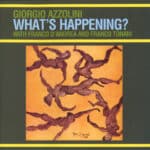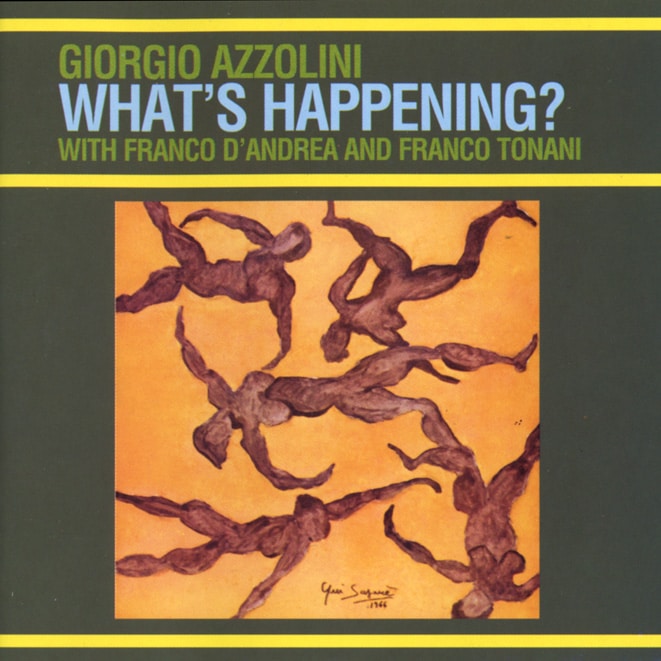“What’s Happening?” for me is one of the most exciting european jazz compositions of this year. Il will always remain a mystery for me the fact that brilliant Italian jazzists do not find greater recognition. In American jazz the italo-american “jazz-men” come immediately after musicians of colored and jewish origin. No other nation has given America vatid jazz representatives as Italy. In Europe however – and above all in Italy – Italian jazz musicians are almost completely unknown.”
Joachim-Ernst Berendt – author of “The New Book Of Jazz”
The two principle qualities that distinguish these interpretations are the musicality of each of the instrumentalists and the exemplary integration in the execution. The rest comes from this musicality and from this integration, thanks to which these compositions are alike, varied and equilibrated. Giorgio Azzolini, Franco D’Andrea and Franco Tonani played together in the Intra’s Club in Milan and participated in the XI Festival of Jazz in Sanremo in March of ’66, as a trio and with saxophonist Brooker Ervin. This period of shared musical experience surely developed the natural styltistic affinities that united them from the beginning. Each of the three musicians has the necessary ability to play long performances as a soloist; but each also has, above all, the gift of listening to what his partners are doing so as to anticipale the direction that they will take and facilitate his entrance. This is particularly well seen here in Giorgio Azzolini’s performance. Records that see the participation of double bass players are frequently mere demonstrations of soloistic virtuism; this won’t be found in this record, only what is necessary for a variation of structure, almosphere and sonoric color in the interpretations. Azzolini’s contribution is surely the decisive factor in maintaining the cohesion that we have spoken of; it is due to his way of playing that contributes largely to the flexible solidity that charactenzes these compositions. In just a few years Franco D’Andrea elevated himself into the top of the Italian pianiste. His style harmoniously unites two principal influences: One one side D’Andrea possesses a cleamess of conception and an elegance of phrasing that reminds me of Bill Evans: on the other side he occasionaly applies a percussive touch that rerninds me of Thelonious Monk and his followers. The clearness and elegance constantly distinguish his way of playing, even in a “free jazz” composition like What’s Happening? As for Franco Tonani, he is actually, in my opinion, the best drummer in Europe, who’s dynamism, sensibility, sense of graduation and the cure of volumes are happily equilibrated. His grand qualities emerge as well both in the most discreet passages of his accompaniment, as in his more authorative interventions as soloist. Front the exposition of Interplay to the conclusion of Moose The Mooche, these interpretations are quality jazz. The Italian musicians and their compositions are still little known outside of Italy. The work done here by Azzolini, D’Andrea and Tonani should contribute to correct this, as a representation of three artists that speak this international language of modern jazz without an accent.
Demetre Joakidimis – “Jazz Hot”, Paris; “La Tribune de Lausanne”
“What’s Happening?” is clearly an allusive title. What is happening in the world of Jazz? It is well known to all its followers: the current jazz scene is as rich as ever with innovative ferments, bold experiments, of dialectic arguments between the protectors of the establishment and the angry revolutionaries. “Free jazz” has divided souis and has ignited a controversy. Naturally to produce free jazz in Italy with Italian musicians means, it is better to say so first, to gather only a part of the signifigance of this trend, which is typically afro-american and which, for this reason, is based on a precise and exasperated cuitural backgrounci that is not found here. All this is clear if one wishes to act with conviction and honesty and not with bluffish intentions with respect to the style. This is what Giorgio Azzolini, Franco D’Andrea and Franco Tonani have done in this record which has to be considered as one of the most flattering goals of Italian jazz of recent times. Having completed his third longplaying album in two years (the second under his own name) Azzolini, which is one of our most sincerely passionale and persistantly pure jazzmen, has wished to adventure into three specimens of “free jazz”, that someone could also judge too amicabile, but instead are, as we say, the fruit of a conviction which has matured slowly and faithfully. These are What’s Happening?, Waiting For M. and We Mean The Blues. The last one is by far the most interesting composition and by itself would de enough to speak interest in the album. It is an attempt to wed the “blues feeling” with the the “free” syntax, in a logical and coherent exchange, never academically cold or trivially eccentric, but animated with authentic inventions and permeated with an esquisite musicality. Even in the complete liberation from any traditional pattem, the substance of blues is ever present, through recurring allusions (correct the title of the composition), under the form of typical rhythms and of unequivocal nuances. The “simultaneous creative contribution” of three musicians flows here in it’s best result. What’s Happening? Instead comes from more ambitious atonal premises, in the prologue of the contrabass but then, with the entrance of the other instruments the prospectives are amplified in an combination of lively suggestions. Waiting For M., contains more suggestive melodies. Next to these three “free” performances, the program counts a classic of Bill Evans, Interplay, a popolar ballad (When I Fal In Love), a composition of D’Andrea, entitled Tension, and a parkerian masterpiece entitled Moose The Mooche, one of the most original themes of the great saxaphone player. As expressed the praise to the three musicians seems explicit, but it is necessary to underline, as a conclusion, the complete maturity reached boy the powerful, yet humble Azzolini, the genuine and precious natural endowments of Franco D’Andrea, who is probably today’s number one jazz pianist in Italy, and the continuous refining properties of the drumming of Tonani, “time keeper” supple and sensitive and able to guarantee the success of the most advanced experiments, alike the best European specialiste.
Pino Candini – “Musica Jazz”, Milan




